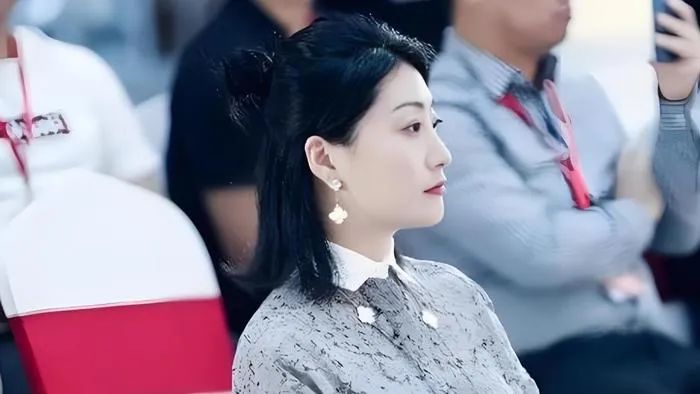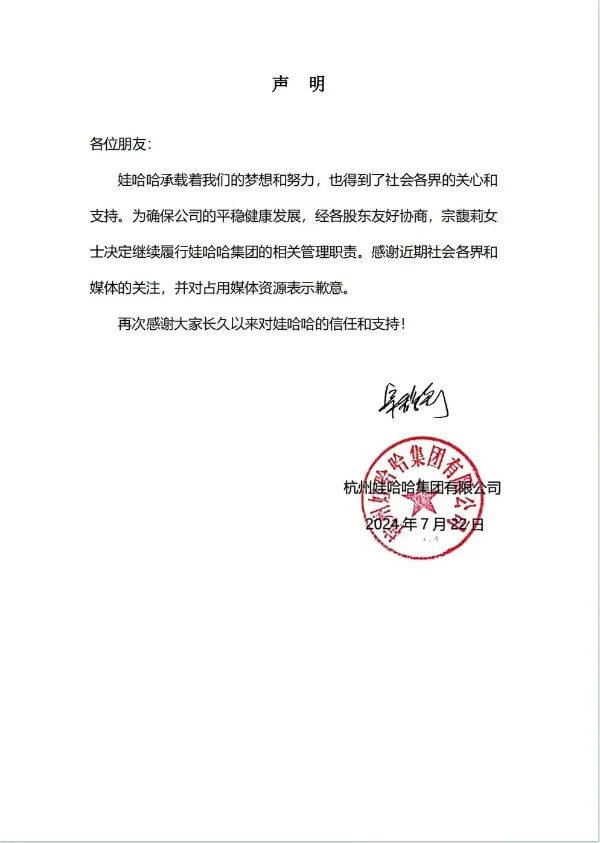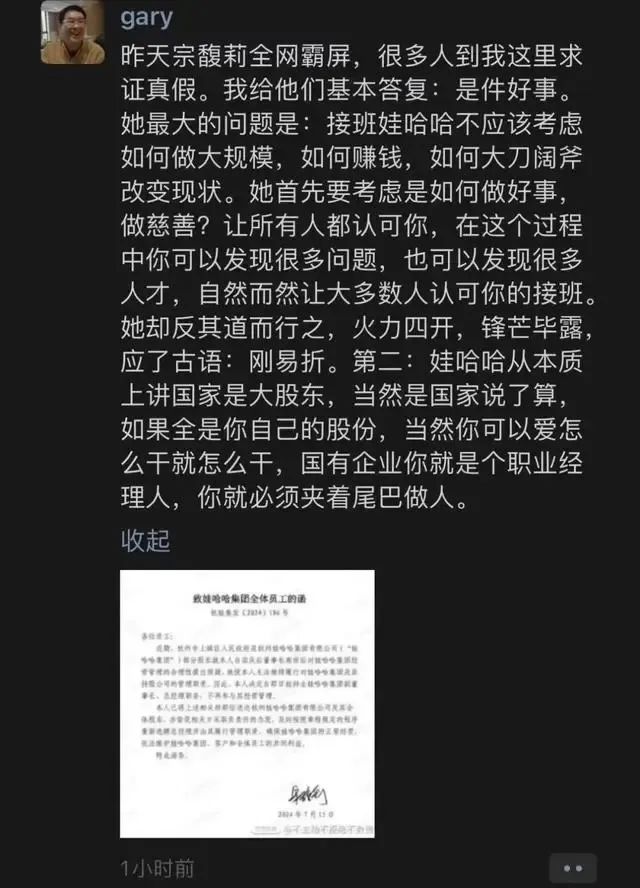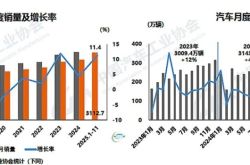Final Chapter of Wahaha's Resignation Incident: Zong Fuli Uses Retreat as Advancement, While Old Shareholders Use Advancement as Retreat
![]() 07/24 2024
07/24 2024
![]() 665
665

Who Won Between Zong Fuli and Wahaha's Old Shareholders?
The much-talked-about resignation of Zong Fuli, Vice Chairman of Wahaha, has finally come to an end.
On the evening of July 22, a statement personally signed by Zong Fuli circulated online.
The statement reads: "To ensure the smooth and healthy development of the company, after friendly consultation among shareholders, Ms. Zong Fuli has decided to continue performing her management responsibilities within Wahaha Group."
At the same time, regarding the public opinion impact caused by this incident, the statement also expressed gratitude to all sectors of society and the media for their recent attention and apologized for occupying media resources.

Thus, the matter of old shareholders' dissatisfaction with Zong Fuli and their hope for her resignation, and Zong Fuli's use of resignation to maintain her position as Vice Chairman of Wahaha, after going full circle, has returned to its starting point.
Although this incident has now come to a close, it will not be the last example in China's business sector. In the case of Zong Fuli and Wahaha, how to reconcile the business philosophies between the second-generation successor and old shareholders is destined to be an inevitable development node for companies like Wahaha.
1. Zong Fuli's Ideals are Doomed to Encounter Obstacles
In this highly publicized resignation incident, Zong Fuli took the initiative to resign, causing the incident to become widely known in a short period of time.
However, regarding the reason for her resignation, Zong Qinghou's younger brother Zong Zehou bluntly stated on social media: "Taking over Wahaha should not focus on expanding scale, making money, or drastically changing the status quo. She should first consider doing good deeds and charity. Let everyone recognize you. In this process, you can discover many problems and talents, naturally making most people recognize your succession. Instead, she went against this, using all her firepower and revealing her sharp edges."
Moreover, Zong Zehou's statement also concisely stated: "Essentially, the state is the major shareholder of Wahaha, so of course, the state has the final say. If it were all your own shares, of course, you can do whatever you want. As a professional manager in a state-owned enterprise, you must keep a low profile."
In summary, Zong Fuli's abrupt use of Wahaha as her own private property with "full firepower" without absolute control over the company inevitably made her the target of dissatisfaction among old shareholders.

Public information shows that the current shareholder structure of Hangzhou Wahaha Group Co., Ltd. consists of three parties. Among them, Hangzhou Shangcheng District Wen Shang Lv Investment Holding Group Co., Ltd., as a subsidiary of the Hangzhou Shangcheng District SASAC, holds the largest share with 46%. Additionally, Zong Qinghou holds 29.4% of the company's shares, while the Hangzhou Wahaha Group Co., Ltd. Grassroots Trade Union Joint Committee (Employee Stock Ownership Association) holds the remaining 24.6%.
If Zong Fuli wants to "do whatever she wants" with Wahaha, she must first acquire Zong Qinghou's 29.4% stake and then gain the support of the company's Grassroots Trade Union Joint Committee. However, based on the current situation, it is questionable whether she can smoothly acquire Zong Qinghou's 29.4% stake, let alone gain the support of the company's Grassroots Trade Union Joint Committee.
Under the current equity ratio, Wahaha is a mixed-ownership enterprise with state-owned capital participation and shared employee ownership. There is no absolute controlling shareholder, and it is not a private enterprise in the traditional sense. Therefore, the concept of a "second-generation Zong" taking over does not apply.
So, the young Zong Fuli wants to run Wahaha in her own way, but under the current circumstances, this ideal is destined to encounter obstacles.
2. Using Retreat as Advancement: The Radicalism of the Second-Generation Entrepreneur
Unable to gain the support of old shareholders and also lacking their trust, Zong Fuli abruptly quit.
However, she did not realize that her public "quitting" immediately exposed Wahaha's internal contradictions to the world, making everyone aware of the inevitable conflicts and struggles within the company.
As an old Chinese saying goes, "family scandals should not be aired in public." No matter how deep or irreconcilable the contradictions between Zong Fuli and the old shareholders, they are internal affairs between Zong Fuli and Wahaha. Under normal circumstances, family matters should be resolved through closed-door negotiations among family members.
But Zong Fuli's approach was to easily throw her "family scandals" onto the internet, an action that not only consumed and occupied a lot of netizens' time but also wasted a lot of internet resources, negatively impacting Wahaha's reputation and brand.
However, none of these consequences were considered by Zong Fuli at the beginning.
As a well-known "second-generation entrepreneur," Zong Fuli embodies the daring and decisive work style of the older generation of entrepreneurs. This approach is not inappropriate in normal business operations, but for Wahaha, which has been established for decades and bears the strong label of Zong Qinghou, this style cannot be forcibly implanted.
Zong Qinghou represents a typical traditional management mindset, where his management and operation of Wahaha are imbued with a strong sense of human touch. However, the younger Zong Fuli, educated in the West, embodies a typical Western mindset, with a results-oriented approach. In her philosophy, lack of results proves incompetence, and incompetence leads to dismissal.
For a company like Wahaha, it is natural for disputes to arise when a harsh Western mindset is abruptly used to take over the warm Chinese-style management.
Zong Zehou's statement reveals the inevitability of this problem—Zong Fuli acted too hastily and offended many old shareholders, ultimately leading to excessive resistance to the implementation of her new policies and thus being forced to resign.
Therefore, Zong Fuli directly "washed her hands" and quit.
3. Using Retreat as Advancement vs. Using Advancement as Retreat: Wahaha's Problems Remain
The conclusion of Zong Fuli's resignation ultimately ended with "After friendly consultation among shareholders, Ms. Zong Fuli has decided to continue performing her management responsibilities within Wahaha Group," achieving a "win-win" situation.
For Zong Fuli, it is clear that her previous resignation played a role because it led to "friendly consultations among shareholders." In other words, she used her public resignation to prompt shareholders to renegotiate, and the result of the negotiation was that she did not actually resign.
This can be seen as using retreat as advancement. In this regard, Zong Fuli emerged victorious.
For Wahaha's old shareholders, Zong Fuli's initial announcement stated that "the Hangzhou Shangcheng District Government and some shareholders of Hangzhou Wahaha Group Co., Ltd. questioned the rationality of her management of Wahaha Group." It was the old shareholders' lack of trust in her that led to their attempts to force her resignation.
However, with the development of public opinion, the old shareholders ultimately allowed "Ms. Zong Fuli to continue performing her management responsibilities within Wahaha Group," meaning that in the face of overwhelming public opinion, the old shareholders who originally hoped for her resignation ultimately gave way and allowed her to continue her management responsibilities at Wahaha.
In this regard, the old shareholders used advancement as retreat, preserving Wahaha's previous state and avoiding further deterioration of the situation.
The current state can be seen as a temporary balance point achieved by both sides after their game. However, this balance point only serves to stabilize the situation for now. Whether Zong Fuli will continue to replace "Chinese-style management" with "Western-style thinking" in the future, or whether the old shareholders will fully support or reject Zong Fuli, remains unknown at present.
The fundamental problem at Wahaha lies in the contradictions and conflicts between the two ideologies.
If this disagreement is not resolved, Wahaha's problems will persist.





